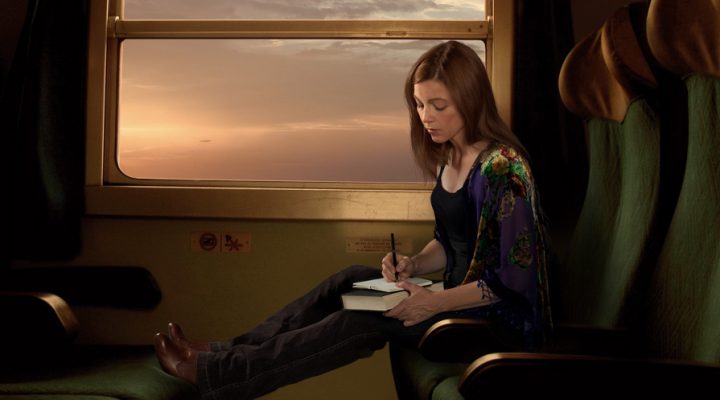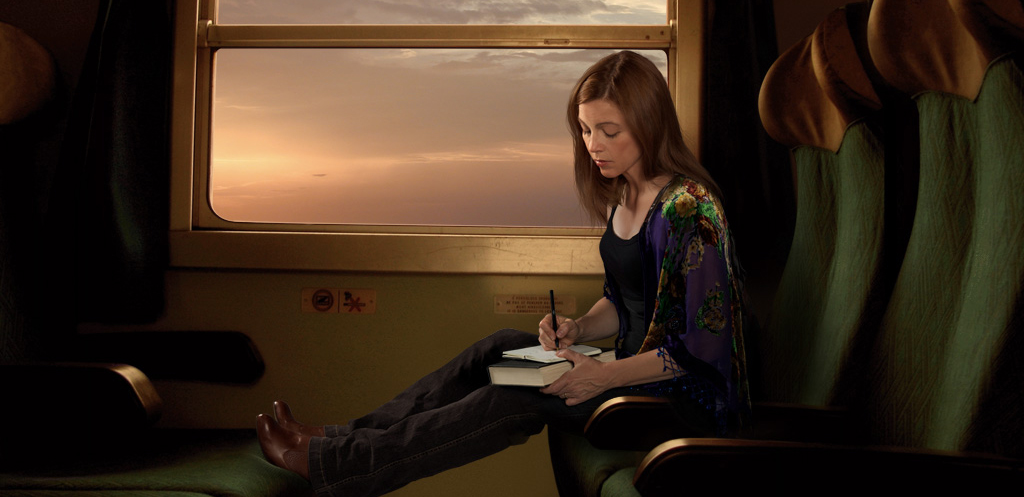Carrie Newcomer may be the holiest person I’ve ever met. The Quaker singer-songwriter embodies the peace and universal love that characterize Quakerism, and it comes across clearly in her songs, which are peopled with characters who are flawed, searching, quirky, broken and holy.
The divine is present in nature and diners and struggles for justice and, as she put it in her 2008 song “Where You Been,” “all us crazy, holy, hungry ones who still believe in something better.”
Newcomer has a new album out, and, following the chaotic years of the Trump administration and COVID lockdowns, it offers a glimpse of optimism and an ongoing sense that we can make a difference. It’s called A Great Wild Mercy. I recently chatted with Carrie about the new album and the current moment.
Susan: This album feels lighter than your last. How have the last few years had an impact on you, and how do you capture this moment in music?
Carrie: The last album, in particular, came out of the pandemic. There was a certain gravity to that album because there was a gravity to what we were all experiencing. I always say, I don’t write because I have an answer, I write because I have a good question. I write myself into my next becoming.
“I don’t write because I have an answer, I write because I have a good question.”
I think a great deal of this album has been about processing, about integrating, about what grounds me in challenging times.
In the title track I say, “There’s news of the world and there’s news of the heart.” The news of the world will tell you to be afraid. Be very afraid. Then be enraged. Then be more afraid. That’s the news of the world — particularly our commercial media and ways of getting information.
The news of the heart is more personal. If you ask someone, “Do you know anyone personally who is generous of spirit and doing what they can to make the world a little kinder place — do you know anyone who has reached across some line for family, for love, for the foodbank, whatever it is — do you know anyone like that?” And almost everyone will say, “I know a lot of people like that. I am like that.” That’s the news of the heart.
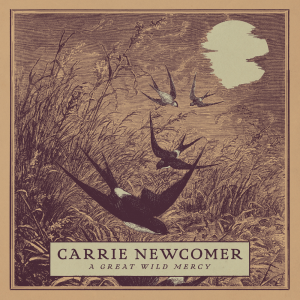 The news of the world says we are disconnected, and there are no bridges. The news of the heart says every time I go out into the world I know I am connected. I am connected to the natural world in ways that are profound and deep and meaningful. I am connected to other human beings on this planet in ways that are profound and meaningful.
The news of the world says we are disconnected, and there are no bridges. The news of the heart says every time I go out into the world I know I am connected. I am connected to the natural world in ways that are profound and deep and meaningful. I am connected to other human beings on this planet in ways that are profound and meaningful.
A lot of this album is what do we do to hold these two things — the news of the world and the news of the heart — in some kind of life-giving creative balance. That also means not sugarcoating it. This is not just about positive thinking or wishful thinking or optimism. It’s not about pretending that what is, isn’t. It’s about finding a way to hold these two and continue to be in the world in ways that are life-giving and meaningful.
Susan: I was thinking about how particularly relevant this album is and the timing of it with what’s happening in Israel and Palestine right now. I am sure that has crossed your mind as well.
Carrie: We are living in conflicted times, the kind of violence that causes a lot of suffering and comes out of a lot of suffering. Parker Palmer, I’ve worked with Parker for years, he says violence is what happens when we don’t know what else to do with our suffering.
Going back to the album, there are some songs that keep affirming, even in challenging times, the thread that pulls through between us and what grounds us. “Start with a Stone” is a song that starts out with let’s step away from the rhetoric and where do we actually ground ourselves? Where do I stand that holds me in challenging times? Start with a stone. Start right here. Start right in this moment. Start where you put your feet down.
Susan: So how do you imagine a way forward?
Carrie: It can feel really over-whelming. This idea of “what can one person do?” — it’s so big. I always have to bring it back home. What can I personally do to make the world just a little better, kinder place in my daily actions and how I live my daily life?
“We underestimate sometimes the difference one person can make in the world.”
I think everybody has their own gifts in that. I am not the person who is going to engineer the desalination machine that improves what we can do for drought in certain areas. That kind of engineering is not my gift. That’s someone else’s gift. But I’ll sing, and I can write. I can speak and use the power of my own life and voice. If you’re a baker, bake. If you’re a singer, sing. If you’re a teacher, teach with all your heart. If you’re a parent or a grandparent, do it with all your heart. We underestimate sometimes the difference one person can make in the world.
Susan: I love the phrase with which you titled the album and the song, “the great wild mercy.” Where in the world did you come up with that?
Carrie: I think it was pulled out of the air. I love the word “mercy.” I have another song called “Season of Mercy.” The word has a power to it. I was trying to come up with a phrase that acknowledged the greatness of it. The ever-presentness of it in ourselves and in the world. That it is not a tame thing. It doesn’t always come and look in the ways I would suppose it should. The world will surprise me. People will surprise you. That thread of goodness will show up when you are least expecting it. There’s a wildness to it and there’s something hopeful in that wildness. That it is more than I could imagine.
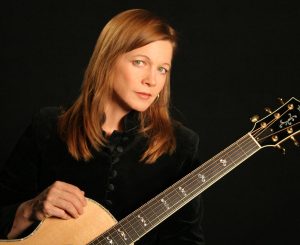
Carrie Newcomer
Susan: One of the things that seems to be consistent in your music is that what matters or not are not grandiose ideas, but back to that present moment and who we are and how we are with others and treat others in those moments. It seems like that has been a thread. Maybe that is the Quaker influence across your life.
Carrie: I like that thread of continuing the practice of living in the eternal now. I have a poem I wrote about expanding time, that whole idea of FOMO — the fear of missing out — whenever I feel like there’s not enough time. The solution is not to add more. Usually, it means being more present in the moment I am in right now. It’s in moments that I am really present in that time expands. When we are right here, time expands. Life expands. Possibility expands. In a time when I have a busy life — I have a passion for life, a career, work as an artist — I am reminding myself, “It’s right here.”
Susan: There was research done talking to people who were 100 or so and the thing that they said, when asked about regrets, the thing they consistently said was I wished I had taken more risk. It reminds me of the lines from one of your songs, “It’s not the things I’ve gone and done I’ll regret or be ashamed; it’s the things I did not say or do because I was afraid.” I think you are right. Knowing this is the moment we have to do these things it becomes clear that great wild mercy comes back to that being in the moment in those small and intimate things.
Carrie: This is an album of encouragement to myself — and a reminder to myself — of that great wild mercy. The assurance.
“There are big ideas in this album, but I always bring it back to human size.”
There are clear and present challenges and dangers in our world to address — each in our own way — each with the daily actions we have power and access to. I think of bringing it down to human size. There are big ideas in this album, but I always bring it back to human size. I can only operate at human size. But there is so much that is doable.
I can’t change the world. I can’t wave the magic wand over the whole world and change it all. I can make significant change in my own life. I can be generous. I can be kind. I can be true. I can use my voice in ways that help bring about that better world.
Love can be really big. It can be so big you cannot get your arms around it sometimes. But kindness, kindness is doable. It is human size. It is like the country cousin to love that washes the dishes when no one asked them to.
This album is a continuation of a theme, hopefully in new ways that have a growing edge to them because I am a growing edge as well. Always bringing back to human size. To the daily. To the now. The personal. Inner work that supports and informs our outer work.
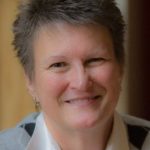
Susan Shaw
Susan M. Shaw is professor of women, gender and sexuality studies at Oregon State University in Corvallis, Ore. She also is an ordained Baptist minister and holds master’s and doctoral degrees from Southern Baptist Theological Seminary. Her most recent book is Intersectional Theology: An Introductory Guide, co-authored with Grace Ji-Sun Kim.

